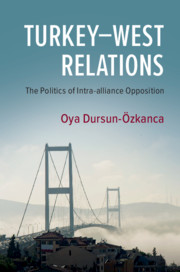Book contents
- Turkey–West Relations
- Turkey–West Relations
- Copyright page
- Epigraph
- Contents
- Figures and Tables
- Preface
- Acknowledgments
- Abbreviations
- Introduction
- 1 Framework of Intra-alliance Opposition
- 2 Turkish Foreign Policy in the Western Balkans
- 3 The Turkish Veto over the EU–NATO Security Exchange
- 4 The EU–Turkey Deal on Refugees
- 5 Turkey’s Energy Policies
- 6 Turkish Rapprochement with Russia in Security
- 7 Turkey’s Foreign Policy on Syria and Iraq
- Conclusion: Turkey and the West – What Next?
- Bibliography
- Index
2 - Turkish Foreign Policy in the Western Balkans
Published online by Cambridge University Press: 15 November 2019
- Turkey–West Relations
- Turkey–West Relations
- Copyright page
- Epigraph
- Contents
- Figures and Tables
- Preface
- Acknowledgments
- Abbreviations
- Introduction
- 1 Framework of Intra-alliance Opposition
- 2 Turkish Foreign Policy in the Western Balkans
- 3 The Turkish Veto over the EU–NATO Security Exchange
- 4 The EU–Turkey Deal on Refugees
- 5 Turkey’s Energy Policies
- 6 Turkish Rapprochement with Russia in Security
- 7 Turkey’s Foreign Policy on Syria and Iraq
- Conclusion: Turkey and the West – What Next?
- Bibliography
- Index
Summary
Against the background of deteriorating EU–Turkey relations and EU’s multiple crises, Turkey has been attempting to use its soft power to consolidate its influence in the Western Balkans and fill a power vacuum left by the EU in the region. Turkey pursues pragmatic Neo-Ottomanism, a Realpolitik, pragmatic and interests-based, rather than ideological, foreign policy in the region. Through active diplomacy and economic statecraft, it seeks to establish itself as an economic and political power in the region before these countries become EU members. As long as Turkey’s accession to the EU remains deadlocked and the Turkish political elites feel alienated from the West, Turkey is tempted to split with the EU to pursue an increasingly independent foreign policy or play a spoiler role in the Western Balkans. Turkey has stepped up its economic, cultural, political, and diplomatic relations with the countries in the region and demanded that priority to be given to regional ownership initiatives and regional economic zones. Turkish foreign policy in the region moves from boundary testing to boundary challenging, as Turkey increasingly competes against the EU for regional influence.
Keywords
- Type
- Chapter
- Information
- Turkey–West RelationsThe Politics of Intra-alliance Opposition, pp. 38 - 62Publisher: Cambridge University PressPrint publication year: 2019
- 2
- Cited by

